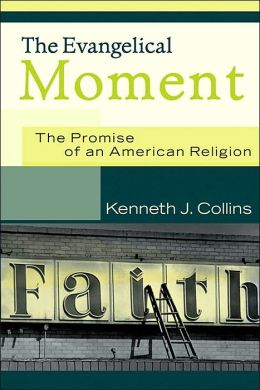Kenneth Collins: The Evangelical Moment
 Kenneth J. Collins, The Evangelical Moment: The Promise of an American Religion (Grand Rapids: Baker Academic, 2005), 288 pages, ISBN 9780801027444.
Kenneth J. Collins, The Evangelical Moment: The Promise of an American Religion (Grand Rapids: Baker Academic, 2005), 288 pages, ISBN 9780801027444.
In his work, The Evangelical Moment: The Promise of an American Religion, Kenneth Collins covers a tremendous amount of territory in a little over two-hundred pages. Collins begins his work by painting a picture of the larger background into which modern evangelicalism now finds itself. By providing this brief but reasonably well-rounded historical backdrop it provides the reader with a sense of awareness of where the evangelical church is located and how we arrived here. Collins then outlines what he understands to be the unique characteristics of evangelicalism: (1) the normative value of Scripture, (2) the significance of the atoning work of Christ, (3) the necessity of conversion, and (4) the imperative of evangelism.1 He quotes liberally from theologians, past and present, in support of his basic contentions; that Scripture is absolutely authoritative, that Christ worked a real atonement, that the need for conversion is essential, and that evangelism, even though attacked,2 is still fundamental to the Christian message.
One of the more distinctive characteristics of Collins’ work is its Wesleyan approach to evangelicalism. Although Collins is obviously not the first Wesleyan to write to/for evangelicalism, it is clear that Wesleyan authors are the minority. Collins recounts a debate that took place between Wesleyan theologian Donald Dayton and reformed author George Marsden. Collins uses the debate as a platform to showcase Wesley’s own words on some very contemporary subjects that have recently come into question within evangelicalism. For example, the authority of Scripture—”if there be any mistakes in the Bible there may as well be a thousand. If there be one falsehood in that book it did not come from the God of truth.”3 The origin of real virtue, “Let reason do all that reason can: employ it as far as it will go. But at the same time acknowledge it is utterly incapable of giving either faith, or hope, or love; and consequently of producing either real virtue or substantial happiness. Expect these from a higher source…Seek and receive them…as the gifts of God;”4 etc. Collins summarizes when he writes, “Wesleyanism is not a species of liberal “Arminian” accommodations to human effort or initiative but is informed by the theological genius of both John Wesley and Thomas Cranmer.”5
One of Collins most helpful sections is his chapter entitled “The Promise of Evangelical Theology.” It is an exceptional introduction to some of the more tricky notions active in modern theological discussion today. For those who are not familiar with terms like “Foundationalism,” “Postfoundationalism,” “Postliberalism,” or “Postmodernism,” and the way are used in theological circles today, this chapter alone is worth the price of the book. Collins doesn’t assume the reader has a background in the field so he starts from the beginning and carefully explains each topic. If you read slowly and carefully through each section, by the time you’re finished with the chapter you should have a reasonably good grasp of these concepts.
Category: Church History, Winter 2008


